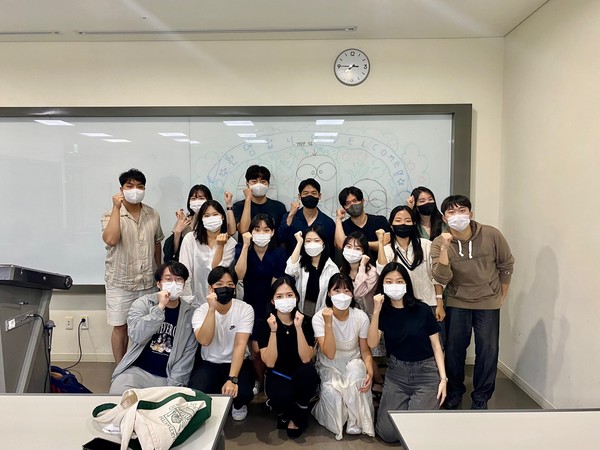Introducing Yonsei Energy & Environmental Economics Forum (YEEF)
THE CLIMATE crisis is undoubtedly one of the most urgent threats the world is facing today. Taking into account the current policies set by governments and the level of carbon emission rates, global temperatures are still on track to increase above the recommended 1.5°C limit set by the 2015 Paris Agreement[1]. Therefore, groups around the world are taking action to raise awareness about the issues surrounding climate change. One such group is the Yonsei Energy & Environmental Economics Forum (YEEF), a group of Yonsei students who come together to discuss various subjects concerning the environment from an economic and scientific perspective. In celebration of Earth Day this April 22, The Yonsei Annals interviewed YEEF’s President Cho Hye-ryeong (Sr., Dept. of History and School of Econ.) and Vice President Yoon Ji-in (Sr., Dept. of Sociology and Dept. of Political Science & Int. Studies) to learn more about their club.

Annals: Can you briefly introduce YEEF?
Cho: YEEF is a student club at Yonsei University that seeks an overall academic understanding of issues surrounding energy and the environment. Members gather to comprehend and respond to the international movement to protect the environment and the effects that follow from the 2050 Decarbonization trends. YEEF was founded in 2011 by Kim Jae-hyuk (Class of ’14, School of Econ.) and since then, the club has held several seminars and sessions based on an economic approach to energy and environmental issues. From the petrochemical sector to the new and renewable energy industry, YEEF has opened up the path to various careers for its members. We have the vision to nurture talents who can respond to future market changes in line with the ever-accelerating decarbonization trends.
Annals: Why did you decide to join YEEF?
Cho: After taking my first environmental-related class as an exchange student in the United States, I realized that the issues that have not been addressed considerably in South Korea are also important in terms of the environment. Subsequently, I became interested in taking a look at the environmental and energy sector more comprehensively. Since I am double majoring in Economics, I wished to approach these topics with a more economical mindset, which is why I ended up applying for YEEF.
Annals: What are YEEF’s main activities?
Cho: All YEEF members need to do five individual presentations and two team presentations before they complete their minimum stay. For example, one presentation would outline a topic on energy and the environment while the other two individual presentations would be on area of interest. Other than this, team presentations that focus on much deeper topics are carried out during the holidays. In my case, I selected the carbon price system, energy deregulation, and overseas cases as the topics for my individual presentations and chose sector coupling as the theme for my team presentation. This semester, we also plan to hold team presentations based on energy and environment-related reports that are in English.
Annals: I noticed that YEEF also holds a “Homecoming Day” for its members. Please explain this event in more detail.
Cho: Every November, a “Homecoming Day” is held as a space for YEEF alumni and current members to gather in a friendly atmosphere. Last year’s Homecoming Day was the first to be held in three years due to the pandemic and approximately 40 past and current members, including YEEF’s very first batch of members, were in attendance. In addition, YEEF holds a meeting with our alumni once every semester to listen to lectures related to associated industries as well as energy and environmental topics. These sessions with YEEF alumni for academic purposes is a “Meeting with the Alumni” event.
Annals: What are some past YEEF presentation topics that you personally found most interesting or memorable?
Cho: I am especially interested in the electricity market, so the presentation on the domestic electricity market and its pricing methods was memorable. Additionally, the presentation that prompted the most active discussion amongst members was one that was done last semester about the direction of climate cooperation between North Korea and South Korea. The topic of energy in North Korea was unfamiliar to me and the dynamic debates on the advantages and disadvantages of inter-Korean cooperation made it very memorable.
Yoon: The most memorable session for me personally was one where we were able to present and discuss the overall issues of energy, nuclear, and power. During this session, we studied issues related to alternative energy sources—such as Energy Storage Systems (ESS) and Small Modular Reactors (SMR)—and issues related to the recent crisis in the power supply chain due to the increased number of wind power limits and restrictions in Jeju Island.
Annals: Has your experience in YEEF influenced your career path?
Cho: When I initially joined YEEF, it was simply because of my interest in the environmental and energy sector. As the sessions progressed, however, my curiosity increased and now I am even in the process of doing an internship at an environment and energy consulting company. I revised my career path after considering how new technology will continue to be created in the environmental field, continuing to receive attention in the future.
Annals: What kind of student do you believe is suitable for YEEF?
Cho: YEEF welcomes any student who has an interest in the environmental and energy sector, particularly those who wish to understand it from an economical perspective. Our club will also be suitable for students who dream of a career in this field in the future. However, due to the nature of the subject matter, it would be more advantageous and worthwhile for students to apply if they have sufficient prior knowledge and genuine passion. Naturally, diligence is also a necessity. In addition to academic activities, YEEF has a friendly atmosphere where social activities, including Member Training (MT) and after-parties, are often held. Students who are able to enjoy this setting are also welcome to join our club.
[1] Natural History Museum

